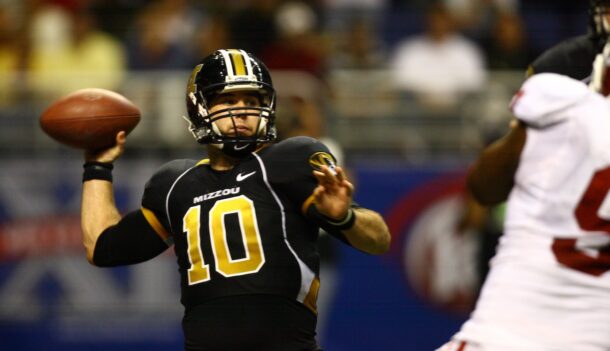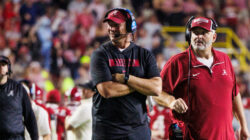Alabama used three fourth quarter touchdowns to pull away from Missouri in a 42-13 win in Saturday’s SEC championship game, earning the Tide its third SEC championship since the 2009 season.
Here’s a look at the top position groups from the conference title game:
ALABAMA
Quarterback: Blake Sims was sensational in Saturday’s showdown in Atlanta, and Missouri’s Maty Mauk simply was not. Sims completed 23 of his 27 pass attempts for 262 yards and two touchdowns without a turnover, while Mauk completed fewer than 50 percent of his passes with most of his productivity coming on just a few broken plays. Sims surgically picked apart a talented Missouri defense, and Mauk missed on many of his limited opportunities to throw comfortably from the pocket. It was obvious who the better quarterback was on Saturday, and he could be found on the podium as the leader of the SEC champs by the end of the night.
Running backs: The Crimson Tide torched Auburn through the air in its regular season finale, but it relied on a punishing rushing attack to stay in front of Missouri in Saturday’s game. Derrick Henry had his best game of the year, amassing 140 yards and two touchdowns on just 20 carries. T.J. Yeldon had a much more modest stat line, but he, too, added 47 yards and a pair of touchdowns in the victory. Missouri’s entire team ran for just 41 yards at less than two yards per carry. It’s easy to see which stable of running backs earned an edge on Saturday.
Offensive line: Alabama’s mammoth offensive line paved the way for the Tide’s productive rushing attack, and it also maintained a clean pocket from which Sims was able to operate for most of the night. The Tide may have allowed two sacks, but for the most part Sims was able to attack Missouri in any way he saw fit, thanks to the protection provided by his line. Missouri didn’t allow any sacks on Saturday, but Mauk still spent most of the game running for his life. The Tigers pathetic rushing attack is another testament to their line’s lack of success. The Tide won in the trenches on both sides of the ball, allowing it to control the game from start to finish.
Front seven: The Tide was just as dominant in its defensive front as it was along the offensive line, wreaking havoc in the Tigers backfield for much of the game. At the risk of sounding repetitive, Missouri could not run the ball effectively all night, and Mauk ran for what seemed like miles in repeated attempts to escape the Alabama pass rush. The Mizzou offense never got into a rhythm, and that’s because Alabama’s front seven never let it.
Secondary: The Alabama secondary got plenty of help in the form of pressure applied by the Tide’s defensive front, but it held up its end of the deal in the back-end of the defense in Saturday’s victory. The secondary was beaten over the top on a few broken plays, but on a down-by-down basis Alabama’s defensive backs were as reliable as any other position group on the team. The Crimson Tide recorded four pass breakups on Saturday compared to zero registered by Missouri, and although Mizzou posted 10 more yards through the air than Alabama it had trouble creating any space from the ‘Bama secondary all game long. The Tide’s defense forced Missouri’s offense to become one-dimensional in the second half, and at that point the secondary began to dominate in a winning effort.
MISSOURI
Wide receivers/tight ends: It might not have looked it on Saturday, but Missouri’s wide receivers had a more productive game than Alabama’s did, even if the score did not reflect that. The Tigers pass-catchers amassed 10 more yards than Alabama on seven fewer receptions, and even though most of that yardage came on broken plays it’s still a testament to the work Missouri’s wideouts did to extend plays down the field. Jimmie Hunt caught a handful of deep balls in traffic, and Bud Sasser and Darius White did work to extend plays and keep drives alive as Mauk scrambled for his life. The Mizzou offense was out of sync from the opening kick, but the Tigers wideouts still served as playmakers during an otherwise ugly performance.
Specialists: Alabama punter JK Scott was fantastic on Saturday, but so was Missouri’s Christian Brinser. The Tigers punter mirrored most of Scott’s numbers inside the Georgia Dome, averaging 43 yards per punt and landing two punts inside Alabama’s 20 yard line without a touchback. Tigers place kicker Andrew Baggett drilled both of his field goal attempts, while Alabama’s Adam Griffith missed his only try of the game. Brinser did all he could to keep Missouri competitive in the battle for field position, and Baggett was clutch in drilling two kicks that Missouri desperately needed at the time.
A former newspaper reporter who has roamed the southeastern United States for years covering football and eating way too many barbecue ribs, if there is such a thing.







